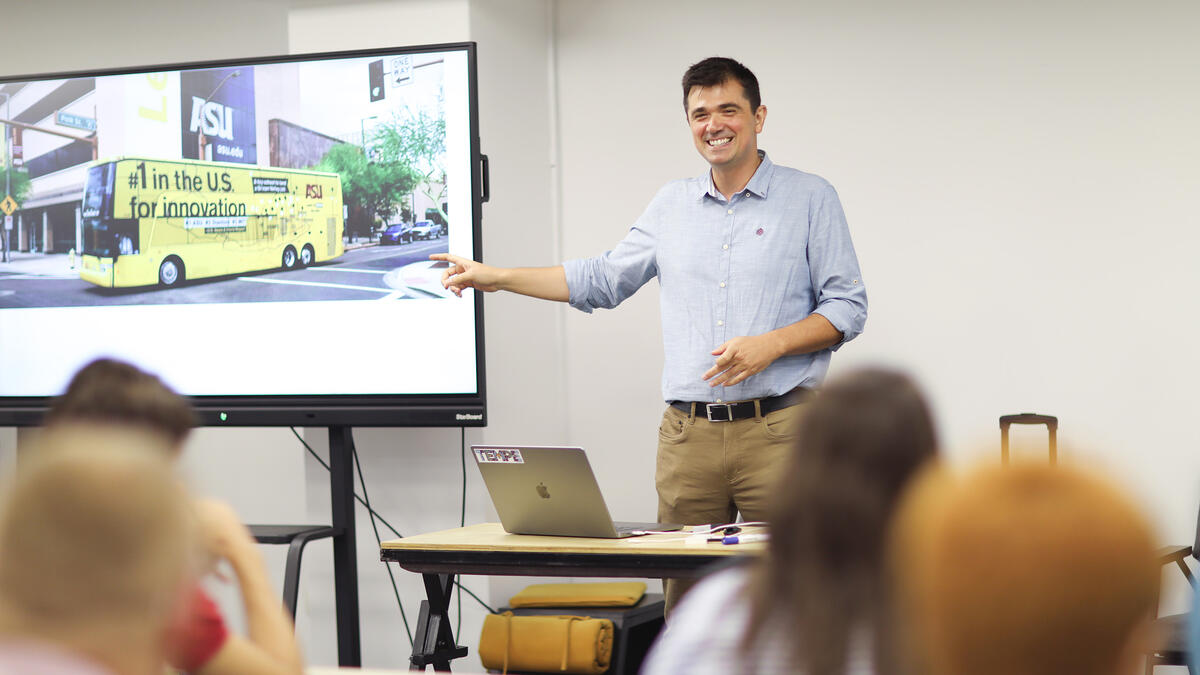ASU entrepreneurs benefit Balkan businesses

Visar Berisha, a professor of electrical engineering with a joint appointment in ASU's Ira A. Fulton Schools of Engineering and College of Health Solutions, instructs participants in the GIST Innovates the Balkans program. Photo courtesy of Innovation Centre Kosovo
Having grown up in Kosovo, Visar Berisha is driven to help showcase innovation in the Balkans to the rest of the world. He recently got the opportunity to do just that through the U.S. Department of State’s Global Innovation through Science and Technology, or GIST, initiative.
“The development and growth of the Balkans region has always been close to my heart,” says Berisha, a professor of electrical engineering in the Ira A. Fulton Schools of Engineering at Arizona State University with a joint appointment in ASU’s College of Health Solutions. “When the Melikian Center at ASU introduced me to the U.S. State Department’s GIST Innovates the Balkans program, it resonated with me, as it felt like an opportunity to make a difference in a region that is very special to me.”
With assistance from the Melikian Center and ASU’s J. Orin Edson Entrepreneurship + Innovation Institute, Berisha’s proposal resulted in GIST Initiative funding powering a two-year program with multiple cohorts of select companies based in the Balkans, during which participants learn how to expand their offerings to the U.S. market.
The program’s first cohort consists of 13 companies taking part over the course of 10 weeks between July and October. Participants take part in training sessions in which they learn from the experiences of ASU faculty entrepreneurs from the Fulton Schools and beyond. They also get mentorship and networking opportunities with ASU-affiliated entrepreneurs matched to their industries, and they conduct interviews with prospective customers. Some participants will also be selected to participate in ASU’s Venture Devils pitch competition.
Designing an international entrepreneurship education program
Berisha took the lead on running GIST Innovates the Balkans with his co-principal investigator Zachary Holman, a professor of electrical engineering and Fulton Schools vice dean for research and innovation.
Berisha and Holman have entrepreneurial experience running startup companies; Berisha co-founded digital health company Aural Analytics, and Holman is a co-founder of coating company Swift Coat and solar technology businesses Beyond Silicon and SunFlex Solar.
Holman and Berisha designed the program with Eusebio Scornavacca, professor and interim director of ASU’s School for the Future of Innovation in Society, who also serves as a professor in the Thunderbird School of Global Management, and Ji Mi Choi, executive director of the National Science Foundation-funded I-Corps Hub: Desert and Pacific Region, which ASU leads.
They modeled the GIST Innovates the Balkans curriculum after the NSF’s Innovation Corps, or I-Corps, which helps academic researchers in science and engineering move projects into the marketplace. Unlike I-Corps, GIST Innovates the Balkans includes startups from a wider variety of industries beyond science and engineering that didn’t all begin in academic settings.
Regional collaborator and entrepreneurship organization Innovation Centre Kosovo helped tailor the curriculum to benefit participating startups as much as possible. The center also helped select the participants from four countries in the region: Kosovo, North Macedonia, Serbia and Bosnia. Additionally, Innovation Centre Kosovo handled logistics for the program and hosted in-person entrepreneurship training sessions.
Denise McKenzie, an academic associate at ASU’s College of Health Solutions, serves as lead instructor for GIST Innovates the Balkans. Also an instructor for I-Corps, she led the in-person sessions in Kosovo for a week in July with assistance from Holman and Berisha, after which participants learned from weekly online sessions.
“We’re teaching a process of how you come up with solutions based on who your customer is,” McKenzie says. “This is something they can use for this product or service, but also in the future. It’s really wash, rinse and repeat.”
Understanding U.S. customers’ needs and learning from entrepreneurs’ experiences
Participating startups include companies in a diverse array of industries, such as AI speech-to-sign-language translator SignAvatar, sustainable hat brand Mirjana Josifoska and marketing platform the Brand Pack. These companies are paired with ASU-affiliated mentors who help participants find potential customers with whom they will conduct about 40 interviews per company.
After the interviews are completed, the mentors help participants analyze the information they’ve gleaned and determine what changes need to be made to their products or services.
“By the program’s conclusion, participating teams will accumulate the evidence needed to confirm or refute product-market fit,” Berisha says. “This insight will help them to construct a data-driven business model and craft a compelling pitch.”
Participating startup teams are in various stages of development, including those with some market share in the U.S. and others investigating whether expansion is worthwhile. One of these teams is Brummell, which invented a blazer jacket engineered to maintain a professional, suit-like look while meeting strict motorcycle gear safety standards through the use of Kevlar.
Nina Levic, CEO and co-founder of Brummell, says the experience has been beneficial for the opportunity to learn from the ASU entrepreneurs about their own experiences running companies and diving deep into their customers’ needs.
“This program has been truly valuable for us, as it has allowed us to extensively explore our customer segment, acquire fresh insights and share experiences with fellow entrepreneurs,” Levic says. “It’s been a great experience for us, and we look forward to witnessing the emergence of similar programs like this within the Western Balkans region.”
Looking to the future, Berisha is investigating making the program self-sustaining through collaborations between ASU and local institutions, possibly through ASU’s Global University Partnerships. He sees the program as helping people see the Balkans in a positive light.
“While much of the world might primarily associate the region with its past conflicts, my experiences in regular visits there paint a different picture,” Berisha says.
“This initiative represents a bridge connecting the untapped potential of the area with the tools, knowledge and opportunities in the U.S. to make a meaningful, sustainable impact. Introducing these ventures to a wider audience allows us to present the Balkans in a fresh light, highlighting innovation and hopefully promoting a shift in attitudes about the region.”
More Science and technology

Compact X-ray laser lab aims to reveal deep secrets of life, matter and energy
X-rays allow us to view inside the human body to diagnose broken bones and other hidden problems. More recent X-ray advances are…

Apollo lunar samples enable ASU researcher to pinpoint moon’s crystallization timeline
A team of researchers, including Arizona State University geochemist Melanie Barboni, in collaboration with scientists from The…

NASA launches space telescope to chart the sky and millions of galaxies
California’s Vandenberg Space Force Base was the site for Tuesday’s 8:10 p.m. launch of the NASA SPHEREx mission aboard a SpaceX…

